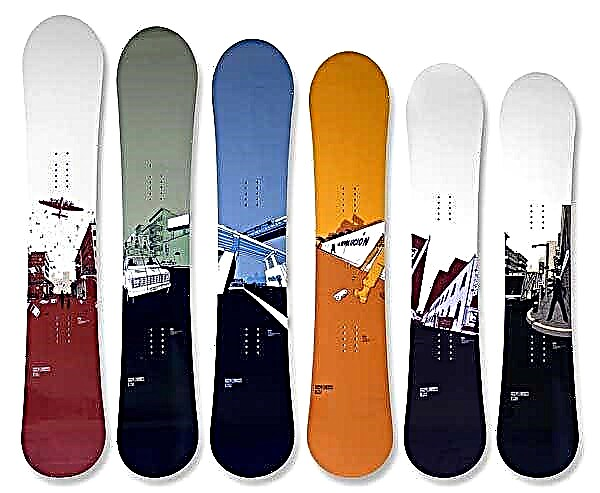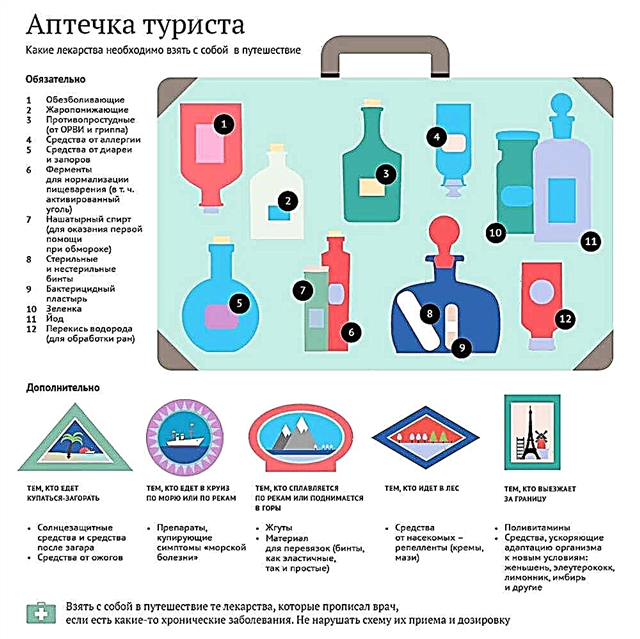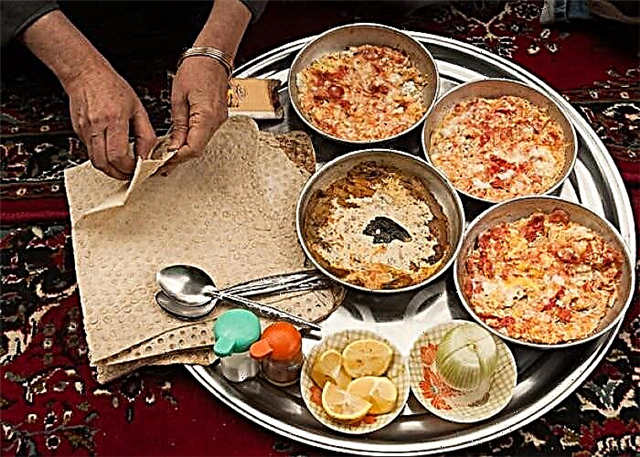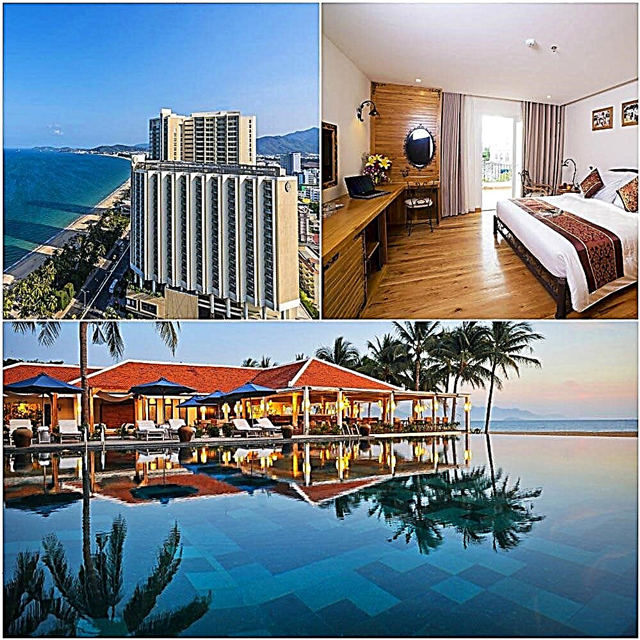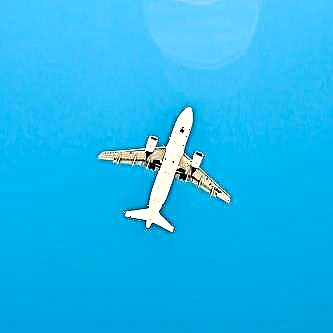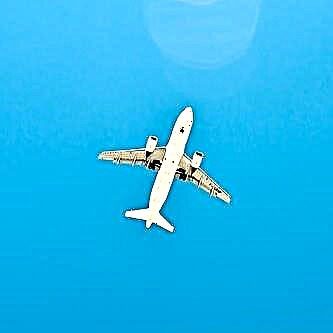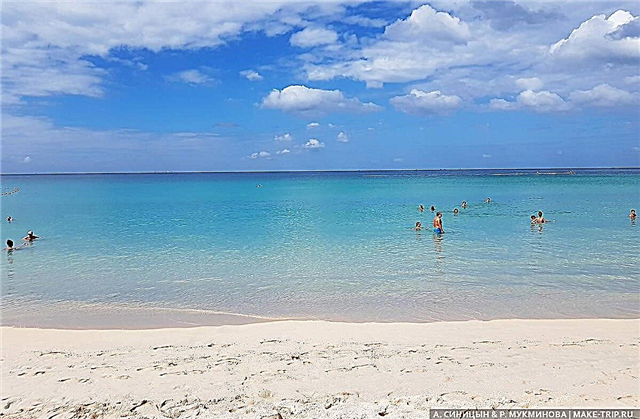What medicines should you take with you in the tourist's first-aid kit, first of all for a hike, on the road, at sea? We will compile a list of drugs based on our travel experience, which is ideal when traveling with children and for all cases of independent recreation in countries such as India, Dubai, Thailand, and other peculiar territories.
- Important! All drugs indicated in the text are not of an advertising nature and are selected according to personal recommendations from medical specialists.
When going on a trip, even a healthy person should think about safety, so that nothing would overshadow the trip. A small first aid kit for tourists will come in handy on any trip. If medicines are transported in small quantities and not in the form of liquids, they will be allowed through customs. Otherwise, you will have to go to the doctor at the resting place and write a prescription for the necessary medicine.
You just need to know its name in Latin and be sure that it is not prohibited in the country. In some cases, it is possible to buy a medicine from a pharmacy with a prescription, which is prescribed in Russia. Such information about which medicines can be exported from the country or imported into it must be clarified directly at the consulate or embassy of the country. The rules change periodically. It will be calmer if you stock up on the phone of a family doctor or a doctor's friend, he can advise on a photo or your story if necessary.
How to put together a first aid kit for the trip?
If possible, put the medicines in a separate package (cosmetic bag, bag). Put only the essentials in your carry-on baggage. Liquids can be transported only in checked baggage, preferably in plastic bottles, with the exception of insulin and some other drugs. At the same time, liquid medicines must be in their original packaging and they have not expired. The names of medicines should be readable, and a prescription should be attached to prescription drugs, even if it is in Russian. It is worth adding to the package with medicines or saving on the mobile phone the text with the dosage and dosage regimens. Manicure scissors, blades, small knives can only be carried in baggage, and syringes are allowed in some cases in carry-on baggage.

A standard set of medicines in the tourist's first aid kit
What should be on a resting drug list first? For a healthy person, wound healing agents, medicines for diarrhea, possibly sunscreens and mosquito repellents will be enough. If you have health problems, then in addition to painkillers and antibiotics, you need to add those that you use regularly to the list of medicines. If you are traveling in a large group or family, it is better to collect a universal first aid kit. Put in it only medicines to which you are not allergic.
A universal tourist's first aid kit, a list of broad-spectrum medicines that will suit most readers on vacation:
- Broad spectrum antibiotics
With signs of angina, bronchitis, sinusitis, intestinal infections, antibiotics will be required. The most common and inexpensive drugs are chloramphenicol, erythromycin and cefelaxin tablets. They have a wide spectrum of action and have minimal contraindications.
- Pain relievers and antipyretics
Inexpensive and effective remedies when the temperature rises and to relieve the painful symptoms arising from this are paracetamol, aspirin and ibuprofen. Dozens of their more expensive counterparts can be found in pharmacies. The composition is approximately the same.
- Antiviral medicines
With symptoms of influenza, ARVI, you will need Arbidol, Teraflu (although this drug also contains paracetamol and vitamin C). To cope with a cough, put Mukaltin tablets and Thermopsis cough tablets, which have expectorant properties, in the medicine cabinet. Honey, ginger root, bell peppers and lemons will help in this case. The latter contain a large amount of vitamin C. From other viruses; herpes, hepatitis, skin rashes - special medications are needed. Your local doctor can prescribe them.
- Remedies for trauma
What is included in the first-aid kit of a tourist in the first place is the means used for injuries. Enough 1-2 bandages, elastic tourniquet, ointment for bruises and sprains ("Rescuer") and bactericidal plasters. Be sure to take hydrogen peroxide, preferably in the form of pencils. Zinc ointment will help if the skin of the hands is chapped, it is applicable even to babies with skin problems.
- Stomach and Digestive Medicines Against Diarrhea
If symptoms of poisoning appear, it is best to consult a doctor. They can be easily confused with other medical conditions such as appendicitis. If you are sure of the diagnosis, in this case sorbents will help: activated carbon or Smecta. If diarrhea appears and an infection is suspected, antibiotics (Levomycetin) can be added to the above remedies. Diarrhea medications are not just pills. Do not forget the proven folk remedies. In case of intestinal upset, a decoction of pomegranate peel helps well. He has no side effects.
- Antihistamines
They are used when allergic reactions occur; edema, urticaria, reaction to insect bites. Some can be used for children. Suitable tablets are Suprastin, Diphenhydramine or Citrine. The effect of the drugs can be felt in 20-30 minutes. It is best to relieve itching and reduce the reaction to insect bites with brilliant green. It comes in the form of pencils. These drugs (except for brilliant green), like many others, have contraindications and side effects. Read the instructions carefully and observe the dosage.
- Sunscreen
You can supplement the list of medicines in a tourist's first-aid kit for a vacation at sea with repellents, and means of protection against sunburn or for sunburn. It should be noted that aerosol packaging on an airplane can raise questions from customs, so it is better to take such products in the form of creams or emulsions and put them in baggage. In carry-on baggage, it is permissible to carry liquids and creams with a volume of no more than 100 ml. In some cases, this volume may be considered excessive. The higher the SPF on the protective equipment, the better.

What not to take on vacation?
- For obvious reasons, you should not take a mercury thermometer on the road, there are electronic counterparts.
- Candles can change their properties when temperatures change. It is better not to use them on the road.
- You should not take medicines for all occasions. OTC drugs can be purchased if needed, simply by knowing their Latin name or active ingredient.
- You should not use potent drugs for prevention, for example, antimalarial drugs. They can depress other organs and ruin your rest. Weakened by such drugs, the body is more vulnerable to infections.
- You shouldn't get unnecessary vaccinations. Already because you may have contraindications to them or the recovery period after vaccination may take longer than usual and the rest will be ruined. Even travel agencies, not to mention polyclinics, do not have the correct information about the need for vaccinations in a particular country. You need to contact the consulate directly.
What to take from medicines to India, Dominican Republic, UAE and other countries in the first place?
More often than in the above countries, Russian tourists visit Thailand. The first-aid kit of a tourist to Thailand and Asian countries is no different from the universal one.More attention can be paid to medicines to restore bowel function (do not forget about activated charcoal or Enteros gel), use only bottled water or filtered water at the hotel.
Pay more attention to sun protection and food choices in restaurants. Local food may contain a lot of spices or contain ingredients that can cause a specific reaction. It is also not worth giving up local food entirely preferring European food, because local food is able to fight local infections better than drugs. Eat only in proven places according to tourist reviews.

